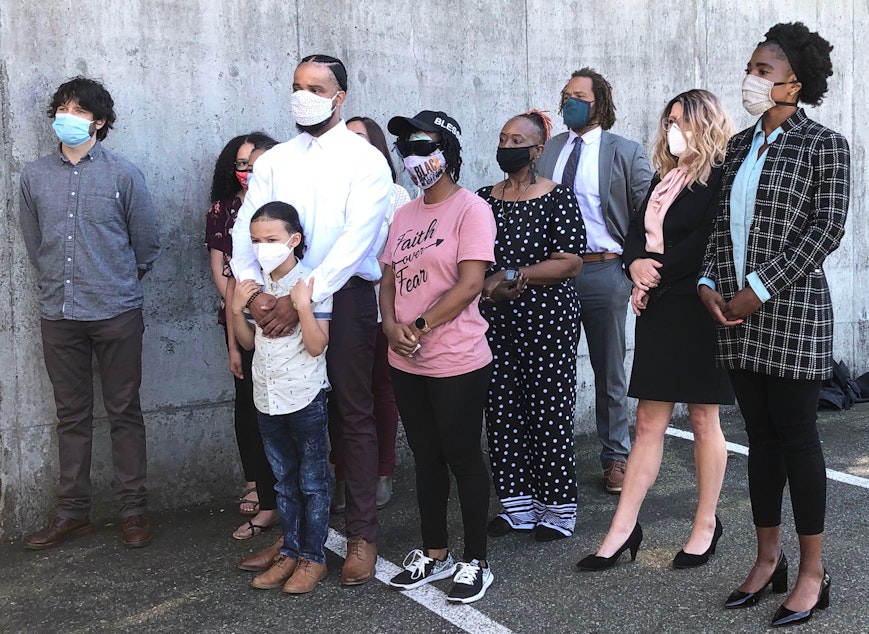A child pepper sprayed, a woman's eye severely injured. Protesters condemn Seattle Police's tactics

The family of a young boy hit with pepper spray and a woman shot in the eye with a rubber bullet are speaking out about the Seattle Police Department's use of crowd control weapons against demonstrators.
Their attorneys say they intend to file lawsuits in the wake of the incidents.
Mando Avery had brought his young son along with him to a peaceful rally against police violence and racism on May 30. He said the protest, held in downtown Seattle, was personal to him — he'd lost a close friend to police brutality.
Avery said he had been standing around when he felt something hit his face. But it didn't dawn on him that police had deployed a chemical irritant, believed to be pepper spray, until he heard his now 8-year-old son screaming.
"I looked down and that's when I felt it in my eyes. But I could see it all over my son," he said during a press conference on Monday, surrounded by relatives.
Footage of the aftermath was captured by 34-year-old hairstylist Evan Hreha. The widely shared video shows the boy screaming and crying in agony as bystanders pour milk into his eyes, in an effort to relieve the pain.
READ: He captured footage of a child pepper sprayed during a Seattle protest. Then he was arrested
Sponsored
The video sparked an immense outcry, and was the impetus behind thousands of complaints lodged against the Seattle Police Department that same weekend.
Civil Rights attorney James Bible, who is representing Avery's family, said the child had to receive medical attention and sustained chemical burns.
"It is an especially cruel, harmful thing that protests about police brutality are met with what? More police brutality," said David B. Owens, another civil rights attorney who is also representing Avery's family.
"There will be lawsuits, and there should be lawsuits," Owens added.
A federal judge on June 12 approved a 14-day ban on the use of chemical irritants and projectile weapons against protesters by Seattle police. Three days later, the Seattle City Council unanimously voted to bar police from deploying tear gas, using chokeholds, and employing several other controversial crowd control tactics.
READ: This woman 'died three times' after Seattle Police hit her with a blast ball
The Seattle Police Officers Guild has challenged those mandates, arguing that such policy changes must be bargained for.
For his part, Avery defended his decision to bring his son to the May 30 protest, which some people have criticized him for. However, he said, the incident left him feeling like he had failed his son.
"He's like, 'Daddy, the only person who you can't protect me from is the police,' you know. And so that's rough."
Sponsored
The incident is currently under review by the Seattle Office of Police Accountability. That investigation is in the "interviewing named and witness employees" stage and is more than halfway complete, according to an online dashboard.
Nikita Tarver, 35, also spoke out on Monday.
She also attended the downtown demonstration on May 30, and said it was her first time participating in a protest.
"People are cheering, you know. They're just excited — [people] of all colors," Tarver said of the scene of the demonstration that Saturday.
She said she had bent down to retrieve a sign she and her friend made from the ground when suddenly, she felt something hit her left eye. That something was later reported to be a rubber projectile fired by police.
Sponsored
"I screamed in sheer terror," said Tarver, who wore bandages over her injured eye and thick, wrap-around sunglasses.
She added that she felt burning in her mouth and nose, in addition to the pain in her eye. She described the experience as being "hell on Earth."
"Never in a million years did I think I would be standing here telling this story," she said.
Several others around the country have sustained injuries similar to Tarver's amid ongoing protests, including a 26-year-old protester in Dallas and a 37-year-old photojournalist in Minneapolis.
So far, Tarver has had one surgery. She said she has developed cataracts and that doctors don't yet know if her retina is still attached to her eye.
Sponsored
"There's so much blood in the back of my eye, they can't really tell," she said.
Moreover, otherwise simple, day-to-day tasks have become difficult for her. Tarver said she can't do her hair or laundry without assistance.
She said she has turned to humor to cope with her new reality.
"This is no joking matter," she said. "But if I don't, I'll cry. And then my cries turn into anger, and anger turns into frustration. And then that's just not good for my therapy."

